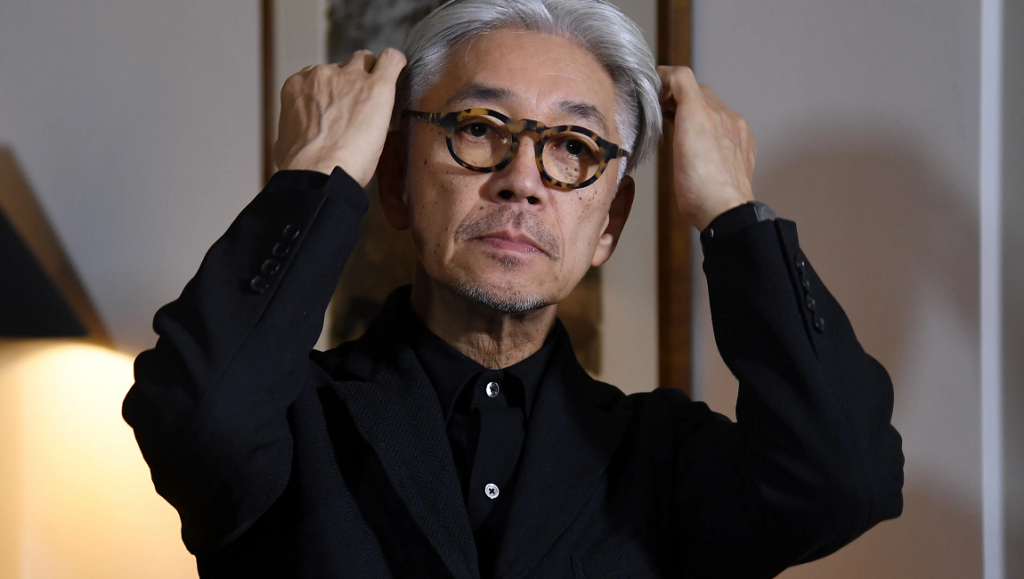Electronic music pioneer Ryuichi Sakamoto looks back on a long and illustrious career which spans six decades, a variety of collaborators and genres, and quite a few soundtracks — most notably, for Nagisa Ôshima’s Merry Christmas, Mr. Lawrence and Bernardo Bertolucci’s The Last Emperor. But having recently turned 71, the Japanese musician, composer, and former member of the Yellow Magic Orchestra shared that he had been diagnosed with rectal cancer; his second cancer diagnosis. His first — throat cancer — came in 2014 and would lead Sakamoto to create the introspective, mournful async in 2017. That album glistened with profound sadness and moments of auditory decay, such as on the haunting “ZURE,” a pensive electronic number which deteriorates continuously as it is consumed by nasty white noise. The throat cancer would eventually go into remission, but news of the rectal cancer soon followed. “From now on, I will be living alongside cancer,” he said in a letter to fans. “But, I am hoping to make music for a little while longer.”
Now, forced to confront his mortality yet again, Sakamoto released 12, an LP which sees him doing away with the eclecticism that marked async a few years earlier, opting for sparse, melancholy minimalism. “20210310” — like all the songs, named for the date it was recorded — opens the album with gentle, spacey synths that oscillate between ominous lows and ecstatic highs, the piece’s faint melody remaining firmly rooted in the abstract. The somber piano of the following “20211130” is interspersed with a cool zephyr of sine waves, its subtle hums filling space between the fragmented notes with misty fascination. There is nothing of the jolty piano tinkering or wild jazz freakouts heard on tracks like “Grasshoppers” or the Sun Ra and Albert Ayler-inspired “MWSIK Part 1.” Instead, Sakamoto’s reflective approach carries him into something vaguely sinister on the haunting “20220202,” as well as the elegiac “20220207,” his meditations regularly taking a turn for the gloomy.
While the mostly instrumental async made room for vocal samples which frankly touched on mortality on “fullmoon” and “LIFE, LIFE,” there are no such literalist comforts offered on 12. The otherworldly soundscapes of “20220214” perhaps best exemplify Sakamoto’s disinterest in concretizing his emotional state beyond what the impressionistic vignettes allow. Textures, tones, and timbres entwine, coalescing before melting away, ethereal whispers giving way to forlorn drones; it might just be the album’s most powerful moment. The final twelve minutes offer some respite from the emotionally taxing near-hour that preceded them. Doing away with synths, “20220302 (sarabande)” introduces the album’s piano-only coda with surprisingly playful nods to Bach, while the penultimate “20220404” radiates last-round melancholy, its classy barfly sorrows occasionally punctuated by unresolved chords.
When hearing Sakamoto ponder his life and legacy, one can’t help but be reminded of Blackstar, the final album of his fellow Merry Christmas, Mr. Lawrence cast member, David Bowie. But unlike Bowie’s busy art-rock swan song, Sakamoto looks back with a more quiet sadness, content with letting his compositions linger in their sketch-like state. 12 feels like a sonic diary, affording an intimate look into an acclaimed artist’s most vulnerable thoughts and feelings, and the sounds and melodies it reveals are breathtaking in their restrained, understated beauty. Here’s hoping he gets to make music for a little while longer.
Published as part of InRO Weekly — Volume 1, Issue 4.


Comments are closed.